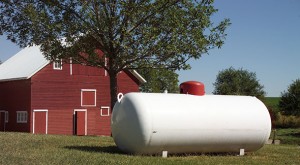Show your local farmers the value of using propane

Propane can be used for crop drying, animal confinement heat, water heating, farm vehicles, off-road equipment and irrigation. Photo: Propane Education & Research Council
Farmers were some of the first propane customers more than 100 years ago when cooking with propane started taking over the kitchen in rural farm homes.
Today, about 40 percent of all rural propane customers use propane for agricultural operations. Those agricultural operations consume 10 percent of all propane sales and about 800,000 gallons annually. Propane tends to be an ideal energy source for rural America. Propane can be used for crop drying, animal confinement heat, water heating, farm vehicles, off-road equipment and irrigation.
In recent years, natural gas and electric utilities have tried to take farm energy business away from propane marketers. Natural gas utilities are always looking for “anchor customers” with large usage levels to justify the expensive expansion of natural gas pipelines.
More than 90 percent of the nation’s crop dryers use propane as their energy source, which makes them an anchor customer. As natural gas companies try to reach crop drying customers, though, they pass a few dozen other homes and businesses along the way to try to hook them up, too.
Here are a few conversation points you can use when talking to farmers about the role of propane on the farm:
■ Propane is affordable – In most parts of America, propane is less expensive than electricity but more expensive than natural gas, when considering the cost of the energy being used and not the cost of infrastructure. Review your farm accounts and make sure you are offering them the best class of service available. Some of your farm accounts may qualify for price-protection programs that may be available in your marketing area. Also, check to see if it is time for a propane storage upgrade to maximize delivery efficiency. The cost of a propane storage capacity upgrade will be much less than paying a natural gas utility to extend a gas main to the farm and will give you the opportunity to pass along some of those delivery efficiency savings to make the price of propane even more competitive with natural gas.
■ Propane is efficient – The propane industry, through the Propane Education & Research Council (PERC), funds product research and development projects to find more energy efficient and cost-effective ways to use propane on the farm. Much of the commercialization efforts for these products take place through PERC’s Propane Farm Incentive Program. Find out more about the Propane Farm Incentive Program and how it can make your farm customers more efficient at www.propane.com.
The United States Department of Agriculture (USDA) can be another source for efficiency incentives on the farm. The USDA Rural Energy for America Program (REAP) offers energy efficiency improvement loans and grants to farmers. More information about the REAP program can be found here.
Connecting your farm customers to efficiency programs offered by PERC and USDA makes you a “good guy” in the energy industry, and it gives farmers the opportunity to save money on their energy bills without having to consider switching to natural gas.
■ Propane is domestic – Farmers, along with the rest of the U.S., love to buy domestic products. The fact that more than 98 percent of propane consumed in the U.S. is produced in North America is a plus for propane. Many consumers don’t realize how quickly domestic production and supply of propane has increased. Remind farmers that propane is a domestic form of energy and produces jobs across the country and in your state.
■ Propane is local – Remind your farm customers that your business is based right in their local communities and you and your employees live, work, play and pay taxes in those local communities.
You could talk about the environmental benefits of using propane on the farm or the portability and reliability of propane, but what really matters is that you take the time to connect with your farm customers so that you become more than just a fuel source. This is a great retention method.
I want to give a shout-out to Cinch Munson, PERC director of agriculture business development, for some of the information in this article. Cinch is a great resource to contact concerning propane opportunities in your agricultural market. He can be reached at cinch.munson@propane.com.
Tom Jaenicke is the founder and the principal adviser at ATomiK Creative Solutions LLC. He can be reached at tom@atomikenergysolutions.com or 810-252-7855.

















Sounds pretty much as we find it in the UK. However, natural gas isn’t such a serious option as the cost to instal the supply pipework can be prohibitive. Oil (kerosene) is the prime competitor as it is cheaper than LPG, though not as versatile.
I like the point that, in the U.S.,suppliers tend to be local, therefore you can push the “buy local” argument. We tend not to have that to the same degree; there are some regional suppliers but the market is dominated by two national suppliers.